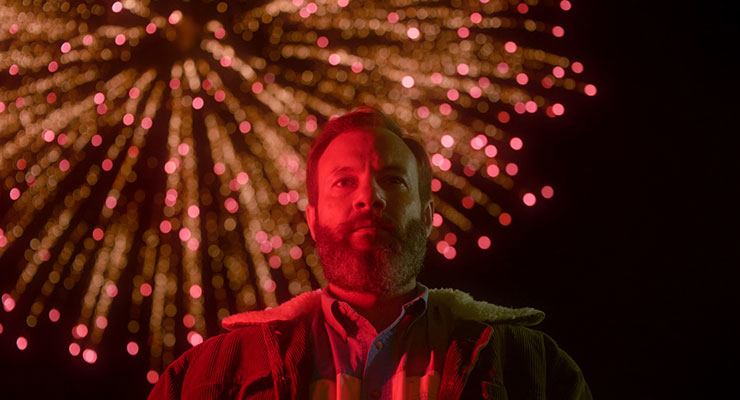
Leandro Faria Lelo in "Dry Wind."
You can feel it the moment you walk into the venue: that invigorating electric charge that a film festival generates. Cinephiles of all persuasions crave it like oxygen. It's like going to the movies, an integral part of any film aficionado's calendar, only on steroids.
You feel lightheaded, like that buzz that sneaks up on you after an unspecified number of drinks. You mingle with fellow travelers, and as the auditorium lights dim, you dive into the swimming pool of a movie premiere. An experience that's intimate yet communal. Abracadabra: behold the magic of the movies.
So what happens when a global pandemic wrests this cherished ritual away from us? You adapt, sure, and place more pressing matters, like securing a steady source of income or creating a revised budget better suited to these uniquely challenging times, at the top of your priority list.
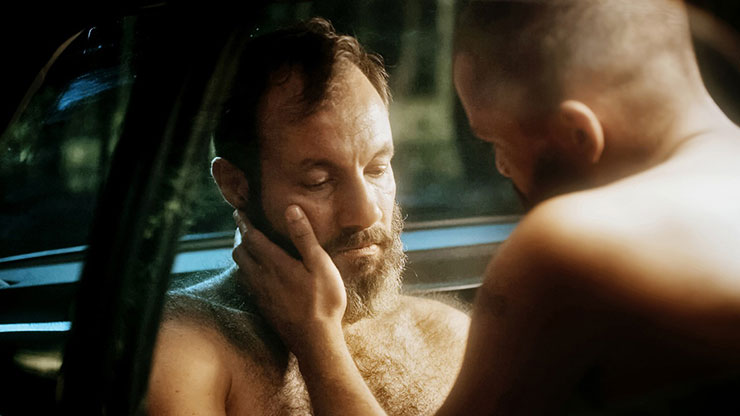
Leandro Faria Lelo, Allan Jacinto Santana in "Dry Wind."
Ah, but a movie lover's heart still yearns for those moments when we come together to worship at the altar of cinema. That's when a local film festival is able to intervene, to fill the void in a way that's practical, convenient, responsible: by going virtual. Granted, it's not the same, but it's the next best thing, and these days, the next best thing is looking mighty fine.
The folks that run the OUTshine Film Festival have stepped up to the plate. Neither rain nor heat nor irate audience members have prevented these tireless organizers from going on with the show. They're thumbing their noses at the 'rona, essentially saying, you may have won these battles, but this war is still up for grabs, In the process, they're giving a beleaguered community something to hold onto: our collective affinity for the seventh art, and that is certainly worth fighting for.
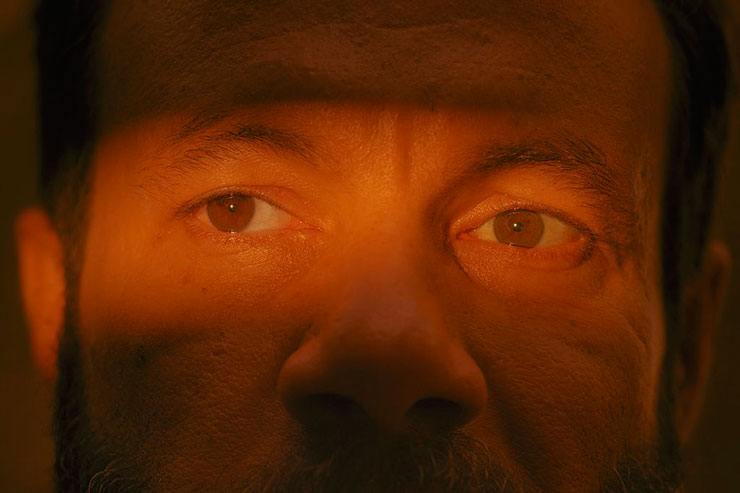
Leandro Faria Lelo in "Dry Wind."
Beyond the logistical challenges that the pandemic brings, it has given the event formerly known as the Miami Gay & Lesbian Film Festival a chance to bring us together in a different way, via the (socially distant) drive-in screening of the (unseen by me) dramedy “Stage Mother,” starring Oscar nominee Jacki Weaver and Lucy Liu, that kicked off the event Thursday night, and a plethora of virtual screenings over the following ten days.
Your intrepid critic is wearing two hats these year: first, as always, providing you with a taste of this year's lineup, and second, as a jury member, an exciting honor that has given me a front-row seat to a degree I had not been privy to in years. (Full disclosure: I worked for the festival during its MGLFF days between 1999 and 2005.)

Susana Pampin in "Margin of Error."
So what's the word on this year's crop of domestic and international cinema?
Programming Director Joe Bilancio and Executive Director Victor Gimenez are aware I've been critical in past years over a tendency to favor the social events surrounding the movie showings over the film themselves, to the point that the gala screenings, ostensibly meant to showcase the crème de la crème, have instead favored toothless crowd pleasers that are middling at best, insufferable at worst. It gives me great pleasure to report that for a second year in row, OUTshine's organizers have made it perfectly clear that the movies come first. From the sliver I've sampled so far, this is an eclectic, diverse lineup that challenges and provokes almost as often as it entertains, with the added bonus that if you're not available to view a film at its scheduled time, each entry is available to stream for several days afterwards.
As for overall quality, let's go with mostly good, with a couple of standouts. What's particularly distinctive this year is that out of the more than three dozen fiction features and documentaries selected to screen, a sizable chunk hail from South American countries, a testament to their vibrant, burgeoning industries, at least before the coronavirus made them hit a collective pause button. Here are capsule reviews of four of these entries. Happy viewing.
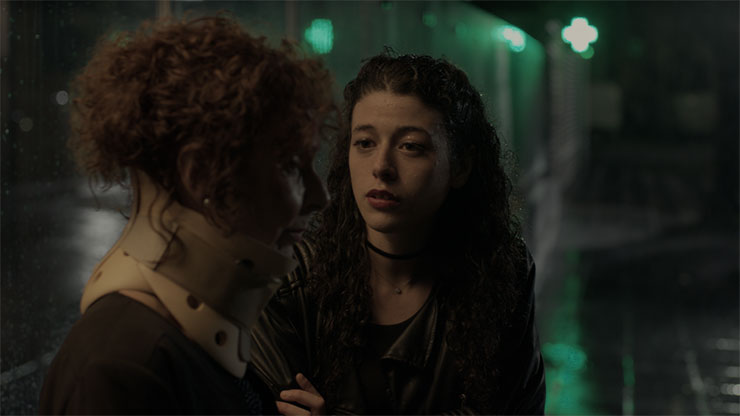
Susana Pampin, Camila Plaate "Margin of Error."
“Dry Wind”: What if Brian De Palma, Paul Verhoeven and Kenneth Anger had a three-way choreographed by Tom of Finland? The resulting free-for-all would probably look and feel a lot like this sultry and stylish portrait of sexual obsession on the down low, set in Brazil's vast, arid state of Goiás. Our protagonist is the bearish, ruggedly handsome Sandro (Leandro Faria Lelo), a jumble of toxic masculinity and untamed urges, who works at a mining company that's undergoing its own identity crisis and laboral woes.
But Sandro is not invested in a quest to unionize spearheaded by his supervisor and longtime friend Paula (Renata Carvalho). What Sandro, with his furry shoulders and intense brooding, yearns for day and night is to surrender his body to his co-worker Ricardo (Allan Jacinto Santana), preferably in secluded exteriors. The trysts are carnal, raw, but not what you'd call intimate. And that's just the way Sandro likes it.
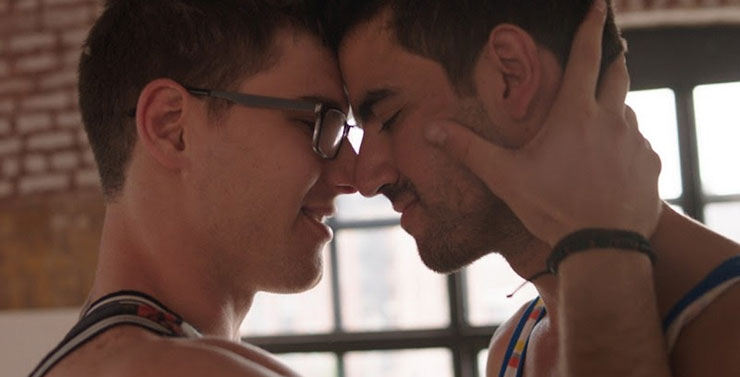
Ben Lukovski, Fernando Barbosa in "Tu Me Manques."
But that's the thing about steady affairs. Emotions eventually butt in, and Ricardo is growing increasingly attached to this taciturn, shut-off man who doesn't see himself playing house with another dude, much less in the open.
Enter blond, aloof Maicon (Rafael Teófilo), a hunky Pretty Young Thing with an affinity for motorcycles and a leather gear fetish. He knows he's hot stuff and is not afraid to show off, in and out of clothing. Naturally, Mr. Sex on a Stick draws the attention of both Sandro and Ricardo, in way both expected and surprising.

Rossy de Palma, Fernando Barbosa in "Tu Me Manques."
“Dry Wind” would still have been a blast if writer-director Daniel Nolasco had settled for being a naughty gallery of pelvic thrusts and spurting fluids. Make no mistake: the film's surface pleasures, such as cinematographer Larry Machado's striking neon hues and the noir-flavored allure that drives Natalia Petrutes' music score, dazzle and occasionally overwhelm the senses. But the filmmaker, making his fiction feature debut, digs deeper into what makes his deeply dysfunctional main character tick, blurring the line between reality and fantasy. If anything, the film's only stumble is attempting to explain too much, but even as it sheds its mysterious aura, Nolasco has made a deeply satisfying, defiantly queer spellbinder that stimulates the nether regions but doesn't neglect that most crucial of organs inside your head.
“Dry Wind” screens Friday, August 21 at 9:15 p.m. and is available to stream until August 25.
“Margin of Error”: Next to the transgressive pleasures of “Dry Wind,” this perky gabfest from Argentina might seem a tad too genteel, but don't write off writer-director Liliana Paolinelli's episodic dramedy, because in its old-hat way, it packs a lot of acute observations about the human condition in 82 minutes.

Fernando Barbosa, Oscar Martinez in "Tu Me Manques."
The short running time is a boon, because despite its portrayal of a tight-knit group of lesbian friends of a certain age, it keeps the focus squarely placed on Iris (Susana Pampín), a woman in her fifties, successful in her career and in love, who agrees to let Maia (Camila Plaate), the college-age daughter of an old friend, stay at her Buenos Aires home while the new arrival finds an apartment and begins her political science studies.
The two women quickly form a close bond despite their age difference, and Iris is glad to find herself playing a mentorship role. That is, until Maia confesses to feeling deeply attracted to an older woman. Iris, so confident in her relationship with her longtime girlfriend Jackie (Eva Bianco) that they don't even live together, suddenly finds that sense of security crumbling. Why is she suddenly plagued with doubts? And why does she start acting like a tongue-tied co-ed? Maia couldn't possibly be referring to her. Could she?
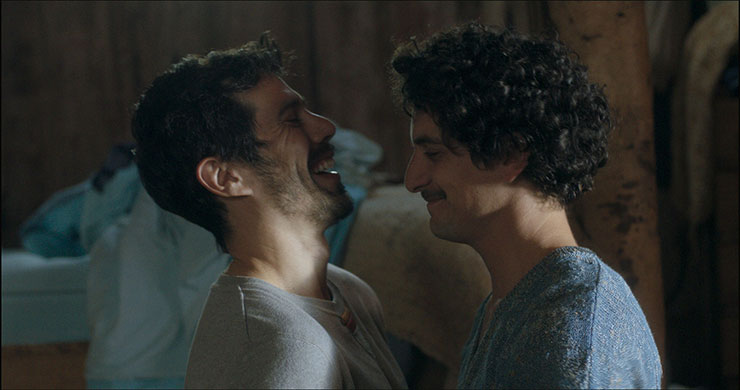
Samuel Gonzalez, Antonio Altamirano in "Los Fuertes."
A tailspin in slow motion ensues, marked by picturesque sightseeing, a wedding weekend for an older couple that turns into purgatory, and a psycho stalker who gives the narrative a much needed shot of adrenaline. Yes, the bickering got on my nerves, but there's an overarching wisdom to Iris' journey, the sense that you're never too old to discover something new about yourself. This is easy-listening cinema, arthouse comfort food that, in its depiction of middle-aged anxiety, often plays like an Argentinian variation on those talky, open-ended French movies from the 1990s. Paolinelli doesn't reinvent the wheel here, but she gives you plenty to chew on.
“Margin of Error” screens Friday, August 21 at 7 p.m. and is available to stream until August 25.
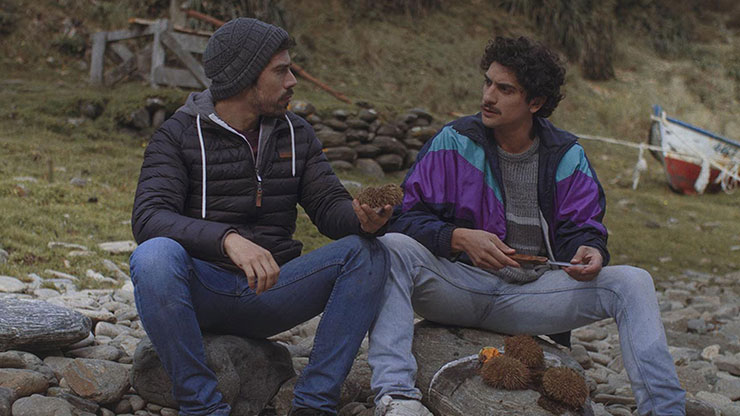
Samuel Gonzalez, Antonio Altamirano "Los Fuertes."
“Tu me manques”: Perhaps the most ambitious selection, as well as one of the more high-profile films showing this year, Bolivia's 2019 entry for the Best International Feature Film Oscar deals with gay suicide in ways that are both powerful and frustrating. Writer-director Rodrigo Bellott layered, thorny tapestry features a byzantine nonlinear structure, a committed cast and an unfortunate tendency to turn the characters into mouthpieces for the ongoing fight against homophobia, both internalized and systemic, in the filmmaker's home country, as well as its ripple effects on those gay men who end up moving abroad.
There are no less than three narrative strands in Bellott's bilingual screenplay. The main section, and what sets the story in motion, zeroes in on the clash between Sebastian (Fernando Barbosa), a Bolivian man in his twenties living in New York City, and Jorge (“Wild Tales'” Oscar Martínez), the rabidly prejudiced father of his ex-boyfriend Gabriel, also from Bolivia. Jorge accidentally accepts Sebastian's video chat request, and that's how Sebastian learns the man with who he once saw himself embarking on an enduring long-term relationship jumped off a building in Miami. Still crushed by the tragedy, Sebastian is later surprised to find Jorge outside his NYC apartment on his own search for answers.
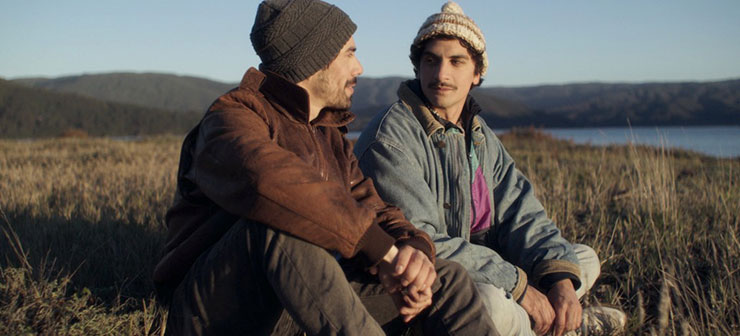
Samuel Gonzalez, Antonio Altamirano in "Los Fuertes."
“Tu me manques,” a screen adaptation as well as an expansion of Bellott's 2015 stage play, also follows a slightly older Sebastian as he fights tooth and nail to produce that very play, by many accounts a game-changer in fostering acceptance of Bolivia's LGBTQ community. Bellott peppers these scenes with a journalist's sit-down interview of Sebastian, a framing device that recalls “Interview with the Vampire” but is used so seldom that you wonder why it's even there. (That reason is eventually revealed, “Life of Pi”-style, but it doesn't merit adding even more content to an already overstuffed script.)
Last but far from least, the film also chronicles the romance between Sebastian and Gabriel. The latter character is (brace yourself) played by three different actors: Jose Duran, Quim del Rio and Ben Lukovski. All three of them are quite affecting as the loving but deeply conflicted lad who is finally able to find happiness and sexual fulfillment with Sebastian. Duran, however, gives the character a delicate vulnerability that gives him a slight edge over his peers.
Bellott has said this is a personal project, which makes it all the more confounding why he chose to saddle the material with so many narrative and thematic layers. And yet, even when it threatens to topple under its own weight, even when some scenes are marred by being staged and delivered at a fever pitch, “Tu me manques” is an accomplished portrait of despair and loneliness. It shows how having someone special in our lives, no matter how enriching, won't help keep the monsters at bay. (Playing a friend of Gabriel and Sebastian, Almodóvar vet Rossy de Palma explains the piercing French expression that gives the film its title.)
The film, which had its local premiere back in March during the Miami Film Festival, stands to attain an even more appreciative LGBTQ South Florida audience this time around. It's overheated, convoluted and a little too much, but it's also pretty hard to shake.
“Tu me manques” screens Saturday, August 22 at 9:15 p.m. and is available to stream until August 26.
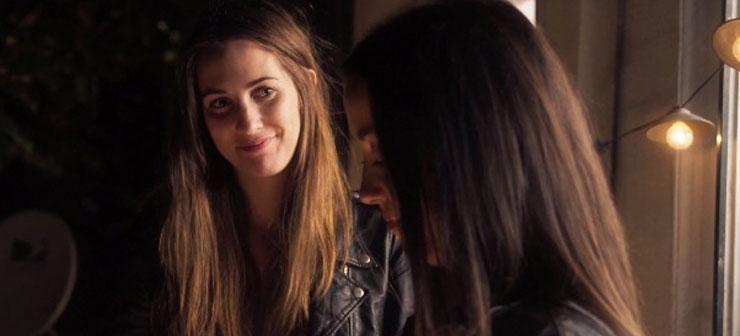
Kate Beecroft, Rachel Alig in "First Blush."
“Los Fuertes” (“The Strong Ones”): A structural polar opposite to “Tu me manques'” dovetailing storylines, this earthy and atmospheric romance, set in Chile's coastal Valdivia community, is a true gift for film lovers. Fans of two beloved British gay movies, the Yorkshire-set “God's Own Country” and Andrew Haigh's “Weekend,” will find plenty to enjoy in the deceptively simple tale of Lucas (Samuel González), an architecture student who comes to visit his sister Catalina (Marcela Salinas) and her husband Martín (Rafael Contreras) before heading to Canada on a scholarship. Then he meets Antonio (Antonio Altamirano), the grandson of Catalina and Martín's housekeeper, a strapping young man who wears dirty tight jeans that are flattering in all the right places and drives a beat-up Ford pickup that seems like an extension of his handsome, rough-around-the-edges personality. He definitely has Lucas' attention, and ours.
The film's early scenes are, for the most part, so basic and perfunctory that they give you no idea how writer-director Omar Zúñiga sneakily sweeps you off your feet while staying true to his clear-eyed portrayal of the challenges of living in a small community where everyone knows each other, but not everyone has evolved when it comes to the notion of two men falling in love.
The sparks eventually fly between Lucas and Antonio. Boy, do they ever. But Zúñiga wisely allows the burgeoning relationship room to breathe, the better to luxuriate in the actors' natural chemistry. González, looking like the love child of Gael García Bernal and Eduardo Noriega, clicks with Altamirano, who sports a mustache that gives Antonio a retro '70s vibe. His character, a fisherman by trade, doesn't see being open as an option, something that Lucas instinctively understands. The beauty of their scenes together lies in their body language, how much can be expressed without saying a word.
The film's English title is “The Strong Ones,” a literal translation that misses the double meaning of the original title, which is a reference to the Spanish forts that surround the region and where Antonio takes part in reenactments of an early 19th century battle that would lead to Chile's independence from Spain. (If you're wondering, yes, Altamirano looks great in uniform.) The windswept vistas, coupled with the depiction of Antonio's struggles at work, help keep the familiar subject matter fresh and engaging.
What Zúñiga accomplishes is a sense of balance between the two men, a harmony that is threatened by their social disparity, which the filmmaker deals with in sensitive and unvarnished fashion, and Lucas' ambivalence about his feelings for Antonio and how they factor into a possible change of plans for him. The director never takes a false step, down to the movie's achingly bittersweet resolution.
“Los Fuertes” was released in Chile five days before the country went into lockdown. It would go on to find an audience when it was made available for digital rental. Bottom line: don't sleep on this gem. It's lovely.
“Los Fuertes” screens Thursday, August 27 at 7 p.m. and is available to stream until August 31.
One last thing: two U.S. indie movies also screening this year are well worth seeking out. In the bisexual dramedy “First Blush,” a hetero married couple that start dating a young woman, with devastating consequences. Writer-director Victor Neumark depicts his central ménage à trois as an emotional minefield that is nevertheless worth the heartache. Set in New York City's Brighton Beach community in the mid-'80s, Eric Steel's polished, nicely textured “Minyan” embeds a touching portrait of a Jewish teen's sexual awakening within the larger context of his existential crisis as a Russian immigrant.
For more information about this year's virtual OUTshine Film Festival lineup, which is set to wrap up on Aug. 30, go to www.outshinefilm.com/films/program.




